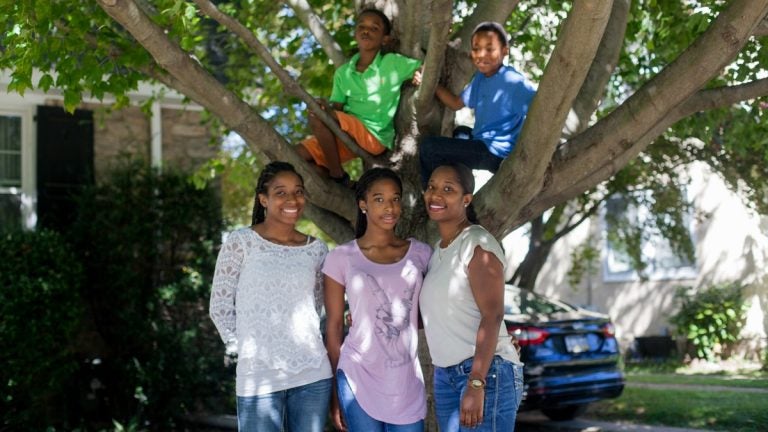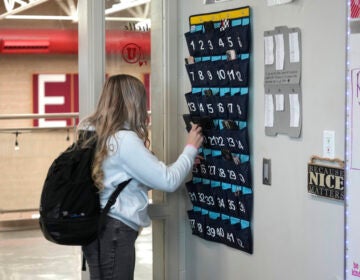Delaware County student who’s stood on both sides of digital divide featured in new NatGeo documentary
A new documentary looks at the "digital divide" between public schools across the country — those that have access to computers and the internet and those that don't.
Listen 0:00
Jameria Miller, (left), pictured with her mother Jamella, sister Kene, brother Bryant and cousin Braylon at their Landsdowne home. The Millers are featured in an upcoming documentary on the National Geographic Channel. (Brad Larrison for WHYY)
 “Without a Net: The Digital Divide in America” premieres on National Geographic Channel Tuesday at 10 p.m. (Finn Partners)
“Without a Net: The Digital Divide in America” premieres on National Geographic Channel Tuesday at 10 p.m. (Finn Partners)
“Almost all of them say, ‘You must be doing this film in Africa, Asia, or South America,’ and I say, ‘No, this is happening right here in our backyard,'” she said. “It’s a far-reaching problem that we really need to get a handle on.”
Kennedy was nominated for an Academy Award for her documentary “Last Days in Vietnam.”
In “Without a Net,” she spends a fair amount of time on Jameria Miller, a senior at Penn Wood High School in Delaware County during the filming.
Miller has seen firsthand the inequity, having attended the more affluent Upper Moreland School District in Montgomery County for two years.
“What I want from high school is just to get a good education so I can go to college,” she said in the documentary.
Miller’s parents are part of the lawsuit against the Pennsylvania Department of Education seeking equity in school funding.
Almost every state — more than 40 — are part of school-finance lawsuits, according to the film.
Kennedy, who does social issue documentaries, hopes this film shows how different communities can champion their public schools. The lawsuit, she said, is one example.
Repercussions in rural communities, big cities
The digital divide hurts students and their families in education and workforce opportunities, she said.
“It’s happening in a pretty pervasive way in more rural communities, but it’s also happening in the cities like Philadelphia, New York City and Los Angeles,” the director said. “They’re being left behind as a result, and now they’re being left behind in our economy.”
The Millers’ experience in the William Penn School District is juxtaposed with Lower Merion School District, located just five miles away. Lower Merion is one of the wealthiest school districts in the Philadelphia region.
Lower Merion High School is fully equipped with a robotics lab and 3-D printers, and it offers engineering, robotics and architecture courses.
In the film, two Lower Merion students wonder what it would be like to go to a different school.
“If I were to imagine school without technology, it’d be a very difficult education,” one student said.
“That’d be a completely different life, aspirations and dreams than we have now, cause our hopes for the future are very technology dependent,” said another student.
Verizon, which co-produced the film, approached Kennedy about making the hour-long documentary.
Voiced by Jamie Foxx, it was filmed over a six-month period.
“I think the Millers are really fantastic family because, despite their circumstances, they really understand how to navigate the system and what needs to be done,” she said.
Miller’s parents attended the premiere at the Verizon Foundation in New Jersey, and they watched a final version as a family.
“I was really happy,” Miller said of the documentary. “They really explain things really well like for people who don’t have any background knowledge about the situation. And anyone can understand what’s going on in my school and in our nation and how schools are funded.”
It also highlights the different technology issues schools face, she said.
“It talks about the importance of technology, talks about the lack of technology … like some schools will have laptops, but they don’t have internet.”
Other school districts profiled were from Allegheny County in Western Pennsylvania; New York City; and rural areas of Eastern Kentucky, Alabama and Coachella Valley, California.
Heeding a ‘call to action’
Jameria’s mother, Jamella, hopes the film persuades its audience to act.
“One of the main things that I will pull out of the film is a call to action to our communities just to say, ‘America is failing. We’re failing our students.’ And if we do not do something, if we do not force legislation, we’re going to continue to be behind,” she said. “We will not be able to compete globally.”
Jamella and her husband, Bryant, both from West Philadelphia, grew up in the Philadelphia School District — but Jamella said there were stark differences in the way they were taught.
Jamella was part of a desegregation program; she attended middle and high school outside of her neighborhood, then went directly to college. At Abraham Lincoln High, she said, she had access to technology, educational opportunity and college prep she otherwise wouldn’t have. Bryant went to West Philadelphia High School, then straight into the workforce, only attending college later as an adult.
But Jamella says the technology gap now is the same as back when she and her husband were in school.
“I think we thought it was different now,” she said. “We thought our nation had gotten to a place where it was better, and it was like, ‘No it’s worse.’ At what point are we going to come into the century that we’re actually in?”
Her daughter Jameria remained driven to succeed, despite needing blankets in the winter when uninsulated classrooms were so cold it was hard to pay attention. She spent her lunch period in the computer lab doing supplemental work.
Miller is now studying at Villanova University’s School of Business on a full scholarship.
The 18-year-old said she realizes closing the digital divide will take time, but hopes it changes in time for her siblings.
“I hope that my brother and sister would have an opportunity to get the better funding, so that our school districts could afford more technology, could afford to just fix basic rudimentary things,” she said. “If you’ve seen the hole in the side of the building, just fix basic things such as that.”
Miller said the experience has triggered her interest in advocacy and social justice issues.
The documentary is a special selection at the New York Film Festival next week. It premieres on National Geographic Channel Tuesday at 10 p.m.
To learn more about the film, visit digitaldivide.com.
WHYY is your source for fact-based, in-depth journalism and information. As a nonprofit organization, we rely on financial support from readers like you. Please give today.




